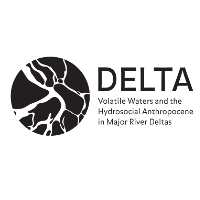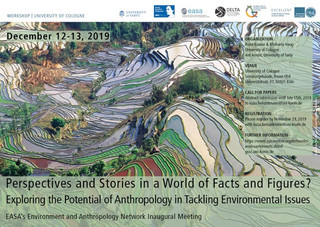Wir freuen uns, diese Ankündigung für einen geplanten Workshop an der Universität zu Köln zu teilen, der von Mitgliedern des DELTA-Teams mitorganisiert wird. Dieser Workshop soll untersuchen, wie unsere anthropologischen Erkenntnisse über die Beziehung zwischen Menschen und ihrer Umwelt bei der Bekämpfung aktueller Umweltprobleme und der Konflikte, in denen sie entstehen, eingesetzt werden können und zu denen sie beitragen.
Wir freuen uns auf die Einreichung von Abstracts (siehe unten) für kurze Pecha Kucha Präsentationen.
Workshopsprache ist Englisch.
Perspectives and stories in a world of facts and figures?
Exploring the potential of anthropology in tackling environmental issues
EASA’s Environment and Anthropology Network inaugural meeting
12-13 December 2019, Cologne, Germany
The EASA Environment and Anthropology Network was founded in 2018 to provide a platform for exchange among environmental anthropologists and to function as an outreach tool to policy makers, practitioners, other disciplines and the wider society to contribute to the understanding and solving of environmental problems across the world. The network explores original and creative ways of collaborating outside academia and disciplinary boundaries, to offer anthropological know-how for dealing with current environmental problems.
This workshop will provide the opportunity to get to know each other’s work, develop the purposes and strategies of the network, and plan possible collaborations. As we are convinced that environmental anthropology can contribute to alternative and more just futures, we place the exploration of possible ways to do so at the heart of our first meeting. We aim to explore the potential for anthropologists, and anthropological insights, in contributing to public debates and solution attempts for current environmental issues. We will share diverse experiences of linking up with policy and practice. We will exchange some of the methods that have proved useful to this end. And we will critically discuss the potential benefits and harms that providing our knowledge in these circles may cause.
Environmental and ecological anthropology have an established tradition of critically exploring current environmental issues. This includes highlighting the effects of both resource exploitation and conservation regimes on local people, research on alternative conceptualizations of nature, and systematic analyses of environmental racism and injustice reproduced by particular policies and practices, from forestry to industrial pollution. Anthropologists examine the complexities of environmental problems and their intertwinement with other realms. As a result, they describe the predicaments of people struggling with various manifestations of climate change, as much as analyse the problems in framing all social and ecological problems in terms of climate change.
While anthropologists often hold valuable insights into disregarded aspects of environmental degradation and conservation, their role in public debates and political strategies for abating these issues remains marginal. On the one hand, this has to do with the popular understanding that environmental issues are for natural scientists to solve, and if a social scientist should be consulted, this better be an economist. On the other hand, this marginal position of anthropologists can be related to the ambivalent attitude towards political engagement and public presence within our discipline.
In order to help explore alternative pathways for environmental anthropology, three keynote speakers will talk about their experiences of linking up with policy and practice: Liana Chua (UK), on orang-utan related activism; Michael Bollig (Germany) on work in the federal sustainability commission; and Dan Podjed (Slovenia) on general challenges and pathways of applying anthropology. Other participants are invited to present themselves and their take on applying anthropology in environmental issues in Pecha Kucha format. This will leave enough time for in-depth discussions on pertinent topics.
Preliminary Program
Thursday, Dec 12th
9.00 Welcome and introduction
9.30 Keynote Bollig plus Q&A
10.30 Coffee break
11.00 Pecha Kucha I (up to 8 presentations)
12.00 Discussion – what can we contribute?
13.00 Lunch break
14.00 Keynote Chua plus Q&A
15.00 Pecha Kucha II (up to 8 presentations)
16.00 Coffee break
16.30 Discussion – why are we not heard/present?
17.30 Visit to a Cologne Christmas Market
Friday, Dec 13th
9.00 Keynote Podjed plus Q&A
10.00 Pecha Kucha III (up to 8 presentations)
11.00 Coffee break
11.30 Discussion – what has (not) worked?
12.30 Lunch break
13.30 Pecha Kucha IV (up to 4 presentations)
14.00 Final discussion – future activities, panels and meetings
15.00 End and farewells
Abstracts:
We invite abstract submissions for Pecha Kucha presentations (more about this format here https://en.wikipedia.org/wiki/PechaKucha) focusing on the speaker’s background, insights, ideas and experiences concerning the application of environmental anthropology. These presentations can, but need not, address one or more of the discussion questions for the workshop (see program).
Funding:
We have secured funds to support travel and accommodation expenses of 8-10 participants who lack institutional funding with 200 € each. If you would like to apply for this funding, please explain your situation together with your abstract submission.
Deadline:
Please send your abstracts and funding requests to luzia.heinzelmann@uni-koeln.de by July 15th, 2019.
If you have any questions, please contact the organizers.
Organization:
Franz Krause, Department of Social and Cultural Anthropology, University of Cologne
Michaela Haug, Department of Social and Cultural Anthropology, University of Cologne
Aet Annist, Department of Ethnology, University of Tartu

